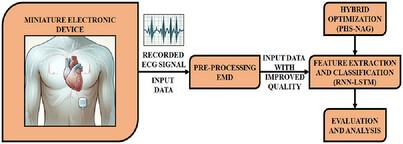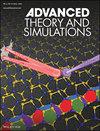Enhancing Energy Efficiency and Battery Lifetime in Cardiac Implantable Devices using Optimized RNN-LSTM
IF 2.9
4区 工程技术
Q1 MULTIDISCIPLINARY SCIENCES
引用次数: 0
Abstract
Cardiac implanted electronic devices (CIEDs) help in elderly people who suffer from critical heart disorders. Patients who suffer from this condition are put at risk by several surgical treatments required to replace the batteries in CIEDs. To extract the ideal feature extraction and classification of Electrocardiogram (ECG) signals from CIED records, the proposed methodology uses a Recurrent Neural Network (RNN) along with a Long Short-Term Memory (LSTM) classifier. This research work aims to solve this issue by providing a novel technique intended to improve the battery life, longevity, and energy efficiency of CIEDs. Moreover, the noise in the recorded ECG data is considerably reduced by the Empirical Mode Decomposition (EMD). A novel integrated optimization approach that combines the Nesterov Accelerated Gradient (NAG) algorithm and Particle Harmonic Search (PHS) is deployed to improve constraints of the RNN-LSTM model. The hybrid PHS-NAG algorithm combines the generic outcomes of PHS's global search capabilities with NAG's local optimization advantages. MATLAB is used for the assessment of the formulated method's performance in improving CIED energy efficiency and extending battery life. The comparative outcomes clearly indicate that the RNN-LSTM model gets 94.5% accuracy and the PHS-NAG technique achieves 98.3% efficiency, which proves the effectiveness of the proposed methodology.

利用优化的RNN-LSTM提高心脏植入装置的能量效率和电池寿命
心脏植入电子设备(CIEDs)可以帮助患有严重心脏疾病的老年人。患有这种疾病的患者面临着更换cied电池所需的几次手术治疗的风险。为了从CIED记录中提取理想的心电图(ECG)信号特征提取和分类,提出的方法使用递归神经网络(RNN)和长短期记忆(LSTM)分类器。这项研究工作旨在通过提供一种旨在提高cied电池寿命、寿命和能源效率的新技术来解决这一问题。此外,通过经验模态分解(EMD)大大降低了记录的心电数据中的噪声。采用Nesterov加速梯度(NAG)算法和粒子谐波搜索(PHS)相结合的集成优化方法改进了RNN-LSTM模型的约束条件。混合PHS-NAG算法结合了PHS全局搜索能力的一般结果和NAG的局部优化优势。利用MATLAB对所制定的方法在提高CIED能效和延长电池寿命方面的性能进行了评估。对比结果表明,RNN-LSTM模型的准确率为94.5%,PHS-NAG技术的准确率为98.3%,证明了所提方法的有效性。
本文章由计算机程序翻译,如有差异,请以英文原文为准。
求助全文
约1分钟内获得全文
求助全文
来源期刊

Advanced Theory and Simulations
Multidisciplinary-Multidisciplinary
CiteScore
5.50
自引率
3.00%
发文量
221
期刊介绍:
Advanced Theory and Simulations is an interdisciplinary, international, English-language journal that publishes high-quality scientific results focusing on the development and application of theoretical methods, modeling and simulation approaches in all natural science and medicine areas, including:
materials, chemistry, condensed matter physics
engineering, energy
life science, biology, medicine
atmospheric/environmental science, climate science
planetary science, astronomy, cosmology
method development, numerical methods, statistics
 求助内容:
求助内容: 应助结果提醒方式:
应助结果提醒方式:


